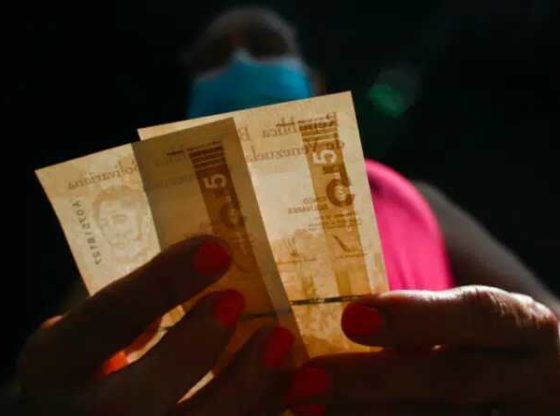Bron: RT-actualidad 26 maart 2022 (SP) orinocotribune 26 maart 2022 (EN) ~~~
De Venezolaanse vicepresident Delcy Rodríguez heeft verklaard dat de bolívar tussen juli 2021 en februari 2022 met minstens 6% in waarde is hersteld.
De laatste weken vertoont de Venezolaanse economie een tendens die tot voor kort als ongewoon werd beschouwd: de koersverhouding tussen de dollar en de bolivar is niet langer een punt van zorg, en veel minder een reden om hals over kop buitenlandse valuta te kopen.
De dagelijkse stijging van de dollarkoers ten opzichte van de bolívar maakte lange tijd deel uit van het dagelijkse gesprek in Venezuela, evenals het ontvangen van WhatsApp-updates waarin werd aangeboden dollars te kopen of te verkopen, maar dit lijkt nu uit het dagelijkse leven te verdwijnen. Het is ook niet meer zo dringend om twee keer per dag de koers van de zogenaamde “parallelle wisselkoers” te controleren, die tot vorig jaar de waarde van de dollar exponentieel verhoogde ten opzichte van de bolivar en als belangrijkste marktreferentie werd gebruikt.
De economische maalstroom die Venezuela van 2016 tot medio 2021 doormaakte, met de ongekende oncontroleerbare hyperinflatie die de koopkracht van de bevolking en hun levenskwaliteit vernietigde, en die de bolívar als munt devalueerde, als geld dat niemand op zak wilde hebben, vertoont nu dus een andere dynamiek.
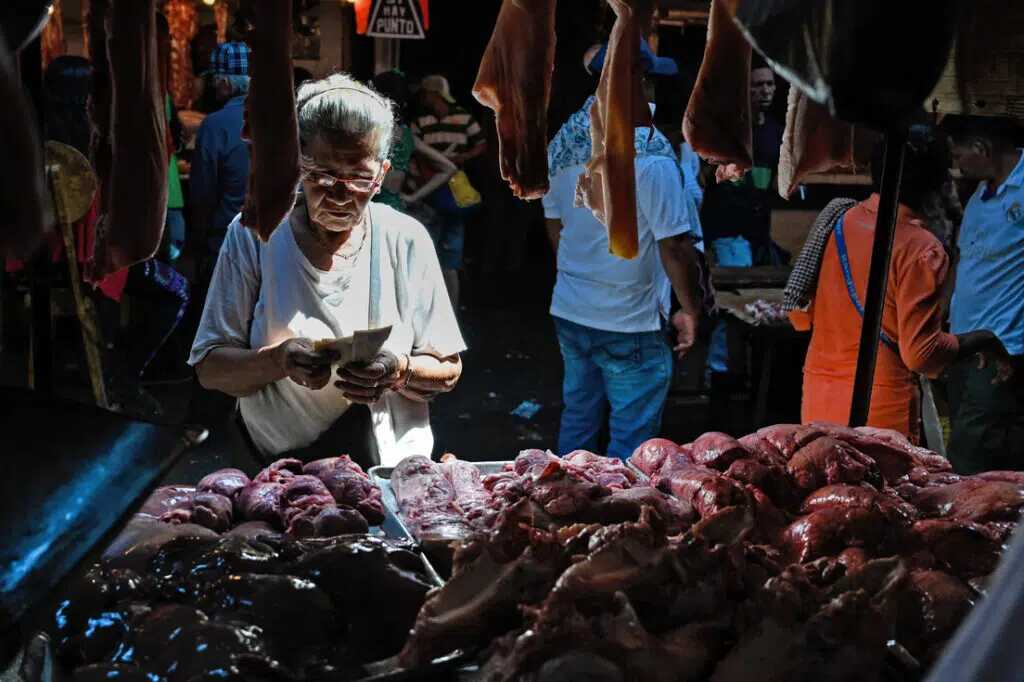
De laatste maanden is er een toename van bolivartransacties. Foto: Federico Parra / AFP
In dit scenario zijn winkels begonnen hun prijzen alleen in bolivar aan te geven, terwijl voorheen – midden in de hyperinflatoire crisis – hun schappen alleen labels toonden met prijzen in dollars, die werden gebruikt om de uiteindelijke betaling van een product te berekenen volgens de wisselkoers die werd gedicteerd door de parallelle markt en onderhevig was aan haar constante en dagelijkse schommelingen.
Hoewel transacties in vreemde valuta nog steeds plaatsvinden-meestal met dollars in contanten, crypto-activa en buitenlandse digitale betaalmethoden, is er nu een duidelijke voorkeur voor het gebruik van bolívars via elektronische betaalmethoden en zelfs biljetten die in omloop worden gehouden.
Begin deze week, bij de presentatie van een rapport in de Nationale Vergadering, liet de Venezolaanse vicepresident en minister van Economie en Financiën, Delcy Rodríguez, weten dat tussen 2021 en 2022, de bolívar zijn vraag heeft hersteld en een waardestijging van 6% heeft gekregen.
Hoe dit is bereikt
Vice-president Rodríguez legde uit dat de huidige economische dynamiek het product is van een reeks maatregelen die de regering sinds augustus 2018 heeft toegepast, via haar “Plan voor herstel, groei en welvaart” dat door president Nicolás Maduro in werking is gesteld.
De vicepresident wees erop dat verschillende acties zijn uitgevoerd die begonnen met de intrekking van de Illicit Foreign Currency Exchanges Law “to facilitate the entry of foreign currency,” die de vrije circulatie van de dollar en andere valuta “in alle commerciële circuits van Venezuela” mogelijk heeft gemaakt.
Andere belangrijke maatregelen waren de vervanging van de prijscontroles door een regeling die met de produktiesectoren was overeengekomen, belasting- en tariefhervormingen, en de totstandbrenging van een nieuwe deviezenmarkt waaraan verschillende economische sectoren kunnen deelnemen en die het mogelijk heeft gemaakt de waarde van vreemde valuta vast te stellen op de legale markt, en niet via de “parallelle dollar”.
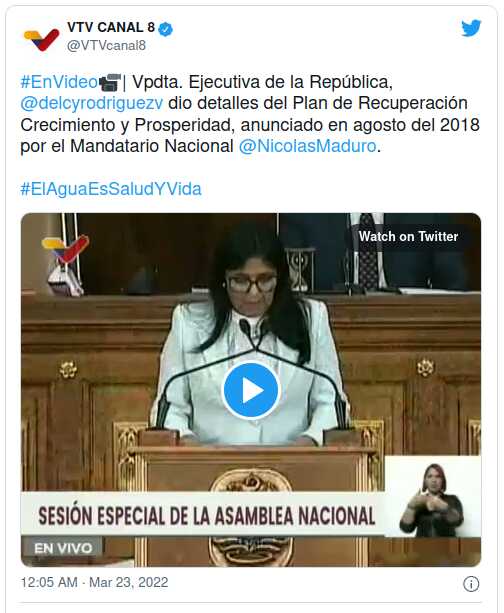
Rodríguez wees ook op de goedkeuring van de anti-blokkadewet, die in het leven is geroepen om buitenlandse investeringen aan te trekken via ” zekere gedragsregels ” te midden van de door de VS en de EU opgelegde sancties, en via de totstandbrenging van een dialoog met de particuliere sector via de Nationale Raad voor Economie, die ” van essentieel belang is geweest voor het geleidelijke herstel van de binnenlandse productie van Venezuela “.
Een ander beleid dat heeft bijgedragen tot het economisch herstel was het programma voor overheidsopdrachten, dat de aankoop van producten van Venezolaanse makelij bevoordeelt ten opzichte van ingevoerde producten. Dit heeft een positief effect gehad op de lokale productie in diverse sectoren.
Hoewel het huidige economische beleid erop gericht is te breken met Venezuela’s afhankelijkheid van de olie-inkomsten, vanwege de verstoringen die deze in de economie veroorzaken, legde vice-president Rodríguez uit dat de huidige situatie ook te danken is aan de heropleving van de olie-industrie, waarvan de productie in december 2021 is gestegen tot meer dan 1 miljoen vaten per dag, en het doel is om in 2022 2 miljoen vaten per dag te bereiken.
Effect van de digitale bolívar
Vice-president Rodríguez wees erop dat een ander belangrijk punt de uitvoering van het Monetair Herstelprogramma was, dat de lancering van de digitale bolívar en het gebruik van een fiduciaire munt die zes nullen minder telt, omvatte.
Ze merkte op dat in januari 2019, toen de door de VS gesponsorde “interim-regering” werd geïnstalleerd, de maandelijkse inflatie zijn hoogtepunt bereikte op 197%, wat Venezuela’s “maximale punt van economische en financiële verstikking” was.
“Een jaar geleden zeiden we dat de munt van wettig betaalmiddel de bolívar is en zal blijven, en vandaag kunnen we significante percentages van herstel van onze munt en onze monetaire soevereiniteit laten zien,” verklaarde vicepresident Rodríguez.
Bovendien was een van de belangrijkste bedreigingen voor de economie het opleggen van een parallelle wisselmarkt, omdat die diende als “een van de meest gebruikte instrumenten” door “extremistische en coupsectoren” om de Venezolaanse bevolking aan te vallen.
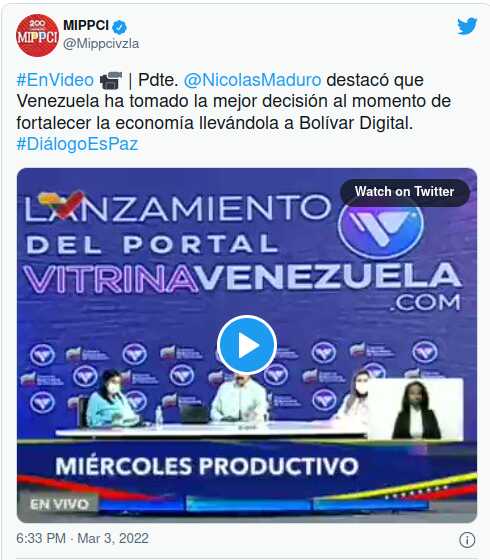
Rodríguez gaf als voorbeeld de onofficiële dollarkoers die tussen juli 2019 en februari 2020 zes keer zo hoog werd, en in diezelfde periode van 2020 tot 2021 klom de dollar zeven keer zo hoog als de bolívar. Tussen juli 2021 en februari 2022 steeg de dollarkoers echter nauwelijks met 15%, een cijfer dat beantwoordt aan de activiteit van de wisselkoertafels waarin de door de Centrale Bank van Venezuela (BCV) gepubliceerde koers is vastgelegd en waardoor de bolívar heeft kunnen heersen over de parallelle dollar.
Daarnaast hangt het herstel van de bolívar ook samen met een toename van de bankvaluta die van invloed is op het gebruik van de Venezolaanse munt via verschillende digitale betaalmethoden, die eind 2021 door 91% van de Venezolaanse bevolking van 16 jaar en ouder werd gebruikt.
“Degenen die hebben opgeroepen tot de dollarisering van het Venezolaanse financiële systeem en het opgeven van monetaire soevereiniteit, zijn geconfronteerd met deze nieuwe realiteit,” zei Rodríguez. Zij legde uit dat deze verandering het einde van de hyperinflatoire cyclus inhoudt en de beteugeling van een inflatie die in de afgelopen zes maanden onder de twee cijfers is gebleven en in februari op 2,9% is uitgekomen, het laagste cijfer in acht jaar.
Groeicijfers
De Venezolaanse economie heeft in 2021 ook positieve indicatoren laten zien, zoals een toename van de maïs- en rijstproductie, die ten opzichte van 2020 met respectievelijk 60% en 17% is gestegen.
“Dit is het product van de inspanningen van de particuliere sector, de productieve sociale bewegingen, en van het regeringsbeleid dat de uitbreiding van kredieten en het opleggen van technische normen heeft goedgekeurd,” verklaarde Rodríguez. Zij wees er ook op dat deze vooruitgang hand in hand gaat met een beleid van “strategische vervanging van de invoer”.
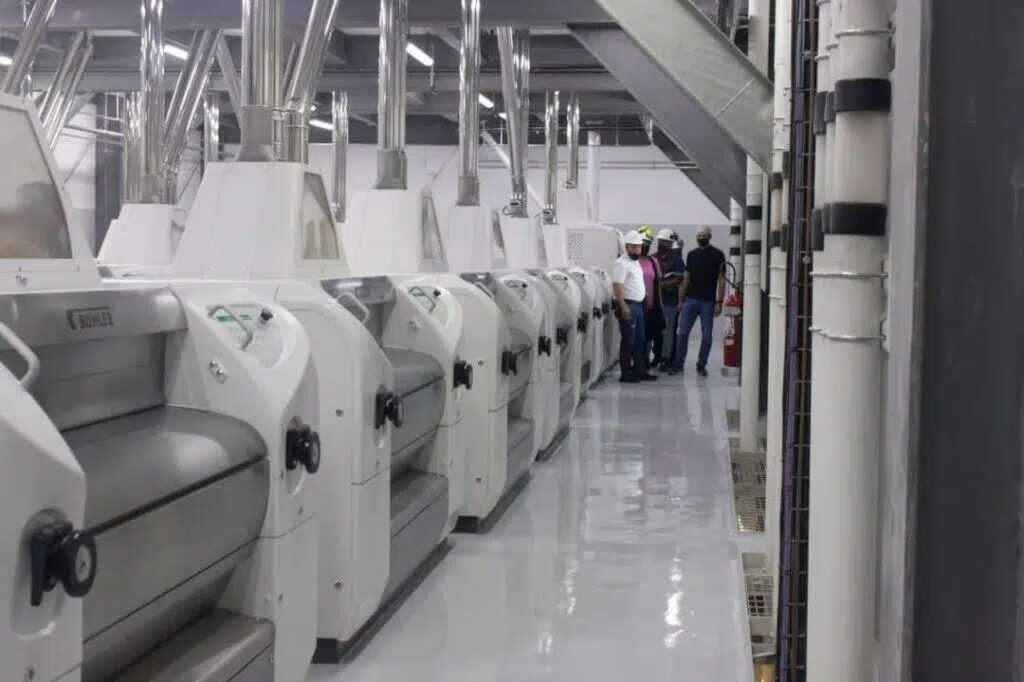
Een ander belangrijk punt is de voedselproductie, die op het moment van de oplegging van de Amerikaanse sancties aan de Venezolaanse olie-industrie in 2017 nauwelijks 20% had bereikt. Eind 2021 is de nationale voedselproductie gegroeid en heeft Venezuela 89% voedselsoevereiniteit bereikt.
Vice-president Rodríguez preciseerde dat in 2018 de invoer van grondstoffen en voedsel voornamelijk ten laste kwam van de Venezolaanse staat, die tot 98% van de invoer van grondstoffen en voedsel voor zijn rekening nam. Nu, tegen 2021, zal 100% daarvan worden uitgevoerd door de particuliere sector en de productieve coöperaties met hun eigen middelen.
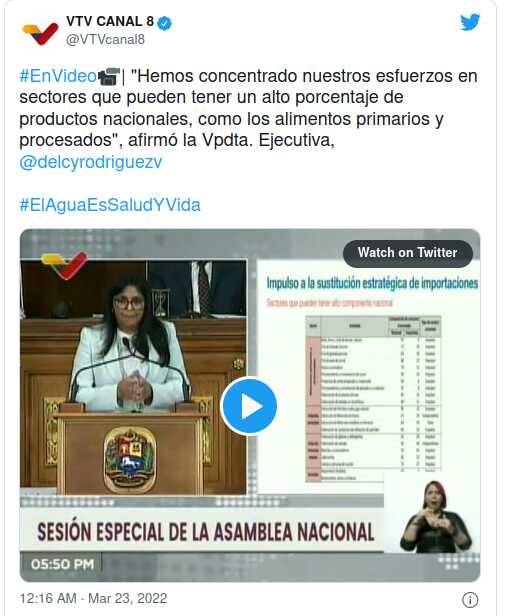
Ook de niet-traditionele export is gegroeid, met een stijging van 76% in 2021 ten opzichte van 2020. Volgens Rodríguez heeft dit ertoe geleid dat de Economische Commissie voor Latijns-Amerika en het Caribisch gebied (ECLAC) Venezuela op de achtste plaats heeft gezet van de landen in de regio die het meest exporteren.
Andere belangrijke gegevens laten een groei van de hotelbezetting en het toerisme zien, dat in 2021 met 94% is gestegen ten opzichte van 2019, een jaar dat niet werd getroffen door de pandemie. Ook heeft de “progressieve verhoging” van de belastinginning, die tot nu toe in 2022 al met 120% is gegroeid ten opzichte van 2021, president Maduro in staat gesteld om met ingang van 15 maart een verhoging van het minimumloon met 1.705% goed te keuren, die steeg van ongeveer 8 bolívars tot 130 bolívars per maand (ongeveer 30 dollar) plus bonussen en die gevolgen heeft gehad voor de salarisschaal van overheidswerkers en gepensioneerden.
Wat denken de Venezolanen?
Yoelis Martínez, een voorbijganger in Caracas, vertelde aan RT dat ze niet langer vindt dat er enig voordeel is aan het gebruik van dollars, en zegt dat de waarde die aan die munt is gegeven tijdens de hyperinflatie is gedaald. “Als ik dollars in kas heb, geef ik ze liever uit en houd ik de bolívars op mijn rekening omdat ze niet meer zo devalueren als vroeger, zei ze. “Ik kan die bolívars gebruiken om voor online diensten te betalen en ze zelfs sparen.”
Volgens Jesús Muñóz, een werknemer in een handelszaak, is de gehechtheid die mensen hadden aan dollars aan het verdwijnen. “Mensen die hier komen, betalen met dollars en bolivars,” zei hij. “Vroeger werden ze boos als je ze wisselgeld in bolivars gaf, maar nu niet meer; veel mensen komen zelfs om hun dollars te wisselen omdat ze soms geld in bolivars nodig hebben.”
Mariel Acosta, een fastfoodverkoper, wees erop dat de laatste maanden de meeste mensen met bolívars betalen bij elektronische transacties, zoals pinpassen, mobiele betalingen, en ook contant. “We verkopen een hamburger voor 5 bolivar of een dollar, en als we wisselgeld moeten geven, doen we dat ook in 5 bolivar, omdat het zo moeilijk is wisselgeld in centen te geven”, legt ze uit. “Als iemand met 4,5 bolivar komt, accepteren we dat, ook als ze ons met een dollar betalen die ongeveer 4,3 bolivar is. Het hangt er allemaal vanaf – de mensen begrijpen dit en ze weten dat we het niet doen om meer te vragen.”
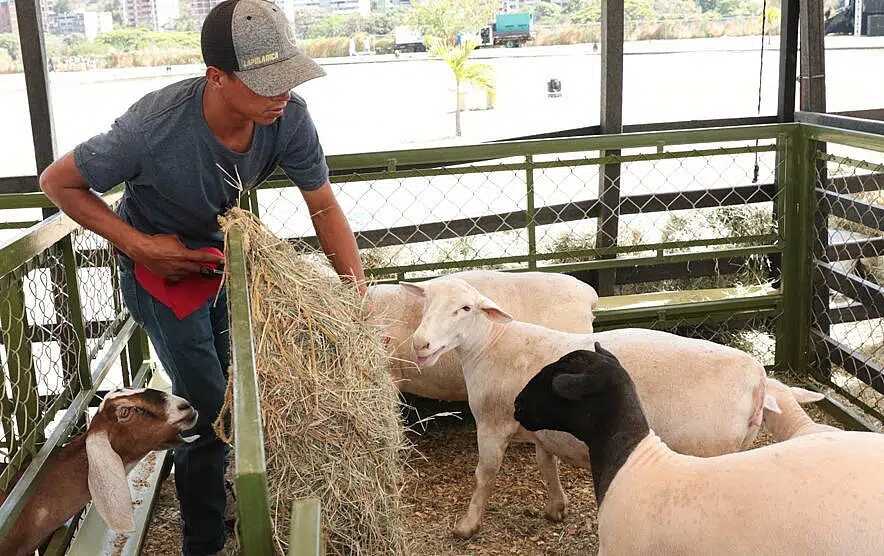
Wilmer Camargo, een koper, zei dat “sinds de dollar begon te dalen” hij liever de vreemde valuta houdt en “zo veel mogelijk” met bolívars betaalt. “Ik probeer mijn spaargeld in dollars te houden, omdat je nooit weet wanneer het weer gaat knallen en ik dat geld liever in huis heb,” drukte hij uit.
María Gabriela Navarro, een andere koper, zei dat in “sommige commerciële etablissementen” de prijzen in bolívars zijn gedaald. “Ik ging wat maandverband kopen, het kostte 9 bolivar en dat leek me erg duur,” zei ze. “De volgende dag ging ik terug voor een ander product en zag dat hetzelfde maandverband was verlaagd tot 5 bolivar en ik kocht het. Ik denk dat dit in verschillende winkels gebeurt vanwege de prijscontrole.”
Daniel Figueroa, een freelance grafisch ontwerper zei: “Ik betaal bijna alles digitaal via zelle en paypal. Een familielid in de VS stuurt me geld via zelle. Ik probeer dat geld te gebruiken om eten te kopen voor het huis en grotere uitgaven omdat het makkelijker is voor de lokale bevolking om het te ontvangen. Wat Paypal betreft, omdat het moeilijker is om een plek te vinden waar ik het kan gebruiken, probeer ik het te sparen of, als het nodig is, wissel ik het om in bolívars, hoewel ze het soms ver onder de wisselkoers uitbetalen.”
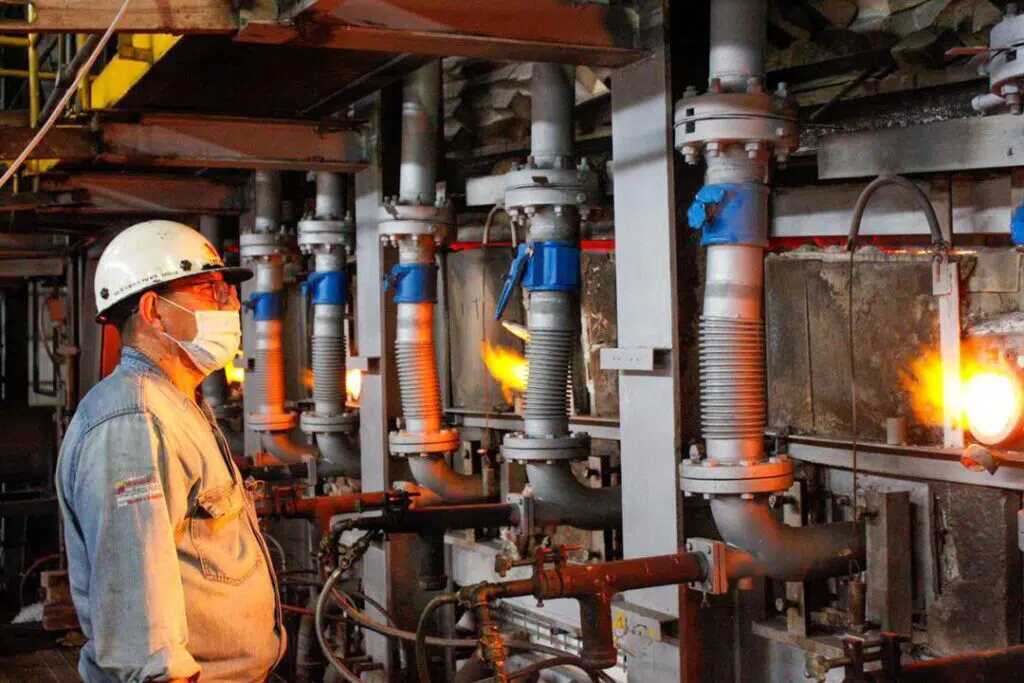
Oswaldo Pérez, een werknemer in de publieke sector, wees erop dat, hoewel de prijs van de dollar stabiel is gebleven en de afgelopen weken zelfs is gedaald, er nog steeds behoefte is aan “veel verbetering” met betrekking tot de lonen. “De loonsverhoging die de president heeft aangekondigd, is, hoewel we die waarderen, onvoldoende,” zei hij. “Ook de stijgingspercentages die we in de salarisschaal krijgen zijn lager dan wat we voorheen hadden en dat is in strijd met onze collectieve rechten. De regering moet dit goed herzien, het mogen niet de werknemers zijn die het meest benadeeld worden.”
Rodrigo Álvarez, eigenaar van een autospuiterij, verklaart dat hij een jaar geleden liever in vreemde valuta betaald werd en vertelde klanten dat het veel makkelijker was om snel aan de materialen te komen om hun auto’s te repareren. “Het was lastig om bolivars op de rekening te hebben staan, want ze devalueerden heel snel en uiteindelijk verloor ik geld, dus moest ik iets meer rekenen als ze me in bolivars betaalden om geen verlies te lijden door de inflatie,” zei hij. “Ik probeerde ze ook snel om te wisselen in dollars of ze in één keer uit te geven. Nu niet meer.”
Andrea Marcano, een verkoopster in een schoenenwinkel, meende dat de mensen de lokale munt opwaarderen. “Ik denk dat de mensen weer van bolívars beginnen te houden,” zei ze. “Het lijkt er ook op dat wanneer je in bolívars koopt, het goedkoper is dan wanneer je met dollars koopt. Je moet heel voorzichtig zijn als je met vreemde valuta gaat betalen, want soms kan iets wat vroeger 10 dollar kostte, je nu 12 dollar kosten.”
Wat er nog moet gebeuren
In een recente toespraak verklaarde president Maduro dat Venezuela met de digitale bolívar “belangrijke stappen” heeft gezet die zijn “grote succes” weerspiegelen.
“Vandaag is de bolívar op weg om weer sterk te worden-de bolívar is verloren terrein aan het terugwinnen,” zei de president, en voegde eraan toe dat het land op weg is naar “een totale digitale economie.”
Maduro wees erop dat om “de reële economie” te blijven versterken, de importsubstitutie moet worden gehandhaafd, de nationale productieketen moet worden versterkt, de export moet worden gediversifieerd en meer buitenlandse investeringen moeten worden aangetrokken.
“Ik heb gezegd dat wanneer de groei van de reële economie inzet door een deel van de belastingen te besparen en de uitgifte van crisp bolívars, echte bolívars, te garanderen; door het gebruik van de aardolierijkdom, met de verkoop van goud, met de internationale reserves; met de oliereserves… we het nationale minimumloon en alle loonschalen en alle collectieve contracten op een duurzame manier zouden herstellen door de inflatie onder controle te houden, de wisselkoers te beheersen,” zei de president. “Die tijd is gekomen.”
Uitgelichte afbeelding: Een vrouw telt bolívar biljetten in Caracas, Venezuela, 1 oktober 2021. Foto: Javier Campos / NurPhoto / Gettyimages.ru
=======================================
Bolívar Currency Gains Ground over US Dollar in Venezuela after Years of Precipitous Devaluation
Bron: RT-Mundo March 26, 2022
Venezuelan Vice President Delcy Rodríguez has stated that the bolívar has recovered its value by at least 6% from July 2021 to February 2022.
In recent weeks, the Venezuelan economy is showing a tendency that until recently was considered unusual: dollar-bolívar parity is no longer a concern, and much less a reason to rush out and buy foreign currency.
The daily rise of the dollar price with respect to the bolívar has been part of the daily conversation in Venezuela for a long time, as well as getting WhatsApp updates offering to buy or sell dollars, but this seems to be disappearing from daily life now. Nor is it a matter of urgency to check twice a day the price of the so-called “parallel exchange rate,” which until last year increased the dollar value exponentially over the bolívar and was used as the main market reference.
Thus, the economic maelstrom that Venezuela went through from 2016 to mid-2021, with the unprecedented uncontrollable hyperinflation that destroyed the people’s purchasing power and their quality of life, and which depreciated the bolívar as a currency, as money no one wanted in their pocket, now shows a different dynamic.
In recent months there has been an increase in bolivar transactions. Photo: Federico Parra / AFP
In this scenario, shops have started to mark their prices in bolívars only, when before—in the midst of the hyperinflationary crisis— their shelves only showed labels with prices in dollars which were used to calculate the final payment of a product according to the exchange rate dictated by the parallel market and subject to its constant and daily fluctuations.
Although foreign currency transactions still occur—mostly with dollars in cash, crypto assets and foreign digital payment methods, there is now a marked preference for the use of bolívars through electronic payment methods and even bills that are kept in circulation.
At the beginning of this week, presentating a report at the National Assembly, Venezuelan Vice President and Minister of Economy and Finance, Delcy Rodríguez, informed that between 2021 and 2022, bolívar has recovered its demand and has gained a 6% rise in value.
RELATED CONTENT: VP Rodríguez Presents Economic Recovery Figures to Venezuela’s Parliament
How this was achieved
Vice President Rodríguez explained that the current economic dynamic is the product of a series of measures applied by the government since August 2018, through its “Recovery, Growth and Prosperity Plan” put in effect by President Nicolás Maduro.
The vice president pointed out that different actions have been carried out that began with the repeal of the Illicit Foreign Currency Exchanges Law “to facilitate the entry of foreign currency,” which has allowed the free circulation of the dollar and other currencies “in all of Venezuela’s commercial circuits.”
Other important measures were the substitution of price controls for a scheme agreed upon with the productive sectors, tax and tariff reforms, and the creation of a new foreign exchange market where various economic sectors may participate and which has made it possible to fix the value of foreign currency in the legal market, and not through the “parallel dollar.”
Rodríguez also highlighted the approval of the Anti-Blockade Law, created to attract foreign investment through “safe conducts” amidst the US and EU imposed sanctions, and through the establishing of a dialogue with the private sector through the National Economy Council, which has been “essential for the progressive recovery of Venezuela’s domestic production.”
Another policy that has helped in economic recovery was the public procurement program, which privileges the acquisition of made-in-Venezuela products over imported ones. This has had a positive impact on local production in various sectors.
Although current economic policies seek to break with Venezuela’s oil rent dependency, due to the distortions it generates in the economy, Vice President Rodríguez explained that the current situation is also due to the resurgence of the oil industry, the production of which raised in December 2021 to more than 1 million barrels per day, and the goal is to reach 2 million by 2022.
Impact of the digital bolívar
Vice President Rodríguez pointed out that another key point was the implementation of the Monetary Recovery Program, which included the launch of the digital bolívar and the use of a fiduciary currency with six zeros less.
She commented that in January 2019, when the US-sponsored “interim government” was imposed, monthly inflation reached its peak at 197%, which was Venezuela’s “maximum point of economic and financial suffocation.”
“A year ago we said that the currency of legal tender is and will continue to be the bolívar and today we can show significant rates of recovery of our currency and our monetary sovereignty,” stated Vice President Rodríguez.
Moreover, one of the main threats to the economy was the imposition of a parallel currency exchange market, since it served as “one of the most used instruments” by “extremist and coup sectors” to attack the Venezuelan population.
Rodríguez gave as example the unofficial dollar price between July 2019 and February 2020 which multiplied six times, and during that same period from 2020 to 2021, dollar climbed seven times over the bolívar. However, between July 2021 and February 2022, the price of the dollar barely grew 15%, a figure that responds to the activity of the exchange tables in which the price published by the Central Bank of Venezuela (BCV) is set and which has allowed the bolívar to rule over the parallel dollar.
In addition, the recovery of the bolívar is also linked to an increase in banking currency which affects the use of the Venezuelan currency through various digital payment methods, which by the end of 2021 was being used by 91% of the Venezuelan population of 16 years and above.
“Those who have called for the dollarization of the Venezuelan financial system and to give up monetary sovereignty, have been confronted by this new reality,” Rodríguez said. She explained that this change includes an end to the hyperinflationary cycle and the containment of an inflation which in the last six months has remained below two digits, closing in February at 2.9%, the lowest in eight years.
Growth figures
The Venezuelan economy has also shown positive indicators in 2021, such as an increase in corn and rice production, which compared to 2020, grew by 60% and 17% respectively.
“This is the product of the efforts made by the private sector, the productive social movements, and by government policies that have approved the expansion of credits and the imposition of technical standards,” Rodríguez stated. She also indicated that these advances go hand in hand with a “strategic substitution of imports” policy.
The Venezuelan State has strengthened its national industry. Photo: Twitter/@MinEcoFinanzas
Another important point has been food production, which at the time of the imposition of US sanctions on the Venezuelan oil industry in 2017 had barely reached 20%. At the end of 2021, national food production has grown and Venezuela has achieved 89% food sovereignty.
Vice President Rodríguez specified that in 2018 the import of raw materials and food fell mainly on the Venezuelan State, which covered up to 98% of imports of raw materials and food. Now, by 2021, 100% of these will be executed by the private sector and the productive cooperatives through their own resources.
Non-traditional exports have also grown, rising by 76% in 2021 compared to 2020. According to Rodríguez, this has led the Economic Commission for Latin America and the Caribbean (ECLAC) to rank Venezuela in eighth place among the countries of the region that export the most.
Other important data shows a growth in hotel occupancy and tourism which increased 94% in 2021 compared to 2019, a year that was not affected by the pandemic. Also, the “progressive increase” in tax collection, which so far in 2022 has already grown 120% compared to 2021, has allowed President Maduro to approve a 1,705% minimum wage increase, starting from March 15, which rose from about 8 bolívars to 130 bolívars per month (around $30) plus bonuses and which has impacted the salary scale of public workers and pensioners.
What do Venezuelans think?
Yoelis Martínez, a passer-by in Caracas, told RT that she no longer considers there is any advantage in using dollars, and says that the value given to that currency during hyperinflation has fallen. “If I have dollars in cash, I prefer to spend them and keep the bolívars in my account because they are no longer as devalued as before, she said. “I can use those bolívars to pay for online services and even save them.”
According to Jesús Muñóz, a worker in a commercial establishment, the attachment that people had to dollars has been disappearing. “People who come here pay with dollars and bolívars,” he said. “Before they would get upset if you gave them change in bolívars but not anymore; many people even come to change their dollars because sometimes they need to have cash in bolívars.”
Mariel Acosta, a fast food vendor, pointed out that in recent months most people pay with bolívars in electronic transactions, such as debit cards, mobile payments, and also in cash. “We sell a hamburger for 5 bolívars or a dollar, and if we have to give change, we give it in 5 bolívars as well—we do that because of the difficulty of giving change in cents,” she explained. “If someone comes with 4.5 bolívars, we accept it, even if they pay us with a dollar that is around 4.3 bolivars. It all depends—people understand this and they know that we do not do it to charge more.”
The promotion of local production in different areas has sought to strengthen the economy. Photo: Twitter/@MinEcoFinanzas
Wilmer Camargo, a buyer, said that “since the dollar began to fall” he prefers to keep the foreign currency and pay with bolívars “as much as possible.” “I try to keep my savings in dollars because you never know when it’s going to shoot again and I prefer to have that money at home,” he expressed.
María Gabriela Navarro, another buyer, said that in “some commercial establishments” the prices in bolívars have dropped. “I went to buy some sanitary pads, they were priced at 9 bolívars and it seemed very expensive to me,” she said. “The next day, I went back for another product and saw the same pads had been lowered to 5 bolívars and I bought it. I think that is happening in several shops because of price controls.”
Daniel Figueroa, a freelance graphic designer said, “I pay almost everything digitally through zelle and paypal. A family memeber in the US sends me money through zelle. I try to use that money to buy food for the house and larger expenses because it’s easier for locals to receive it. As for Paypal, since it’s harder to find a place where to use it, I try to save it or, when I need to, I change it into bolívars, although sometimes they pay it well below the exchange rate.”
Public sector workers demand salary and contractual improvements. Photo: Twitter/@MinEcoFinanzas
RELATED CONTENT: Venezuela’s Tax on Foreign Currency Transactions Starts Monday
Oswaldo Pérez, a public worker, pointed out that, although the price of the dollar has remained stable and has even dropped in recent weeks, there is still a need to “improve a lot” regarding wages. “The raise that the president announced, although we value it, is insufficient,” he said. “Also, the percentages that we are being given in the salary scale are lower than what we previously had and that violates our collective rights. The government should review this well, it should not be the workers who are harmed the most.”
Rodrigo Álvarez, owner of a vehicle painting shop, states that a year ago he preferred to be paid in foreign currency and told clients that it was much easier to get the materials to repair their cars quickly. “Having bolívars in the account was a headache, because they devalued very quickly and I ended up losing money, so I had to charge a little more if they paid me in bolívars so as not to lose because of inflation,” he said. “I also tried to change them quickly to dollars or spend them at once. Not anymore.”
Andrea Marcano, a saleswoman at a shoe store opined that people are revaluing the local currency. “I think that people are beginning to love bolívars again,” she expressed. “It also seems that when you buy in bolívars it is cheaper than if you buy with dollars. You have to be very careful when you are going to pay with foreign currency, because sometimes something that used to cost 10 dollars can now cost you 12.”
What is yet to be done
In a recent speech, President Maduro stated that with the digital bolívar, Venezuela has taken “important steps” that have reflected its “great success.”
“Today the bolívar is on the road to become strong again—the bolívar is recovering lost territory,” said the president, and added that the country is heading towards “a total digital economy.”
Maduro pointed out that in order to continue strengthening “the real economy,” import substitution must be maintained, the national production chain strengthened, exports diversified and more foreign investment should be attracted.
“I said that when the growth of the real economy sets in by saving part of the taxes and guaranteeing the issuance of crisp bolívars, real bolívars; by the use of the oil wealth, with the sale of gold, with the international reserves; with oil reserves… we were going recover the national minimum wage and all wage scales and all collective contracts in a sustainable manner controlling inflation, controlling the exchange rate,” said the president. “That time has come.”
Topfoto: : A woman counts bolívar bills in Caracas, Venezuela, October 1, 2021. Photo: Javier Campos / NurPhoto / Gettyimages.ru
